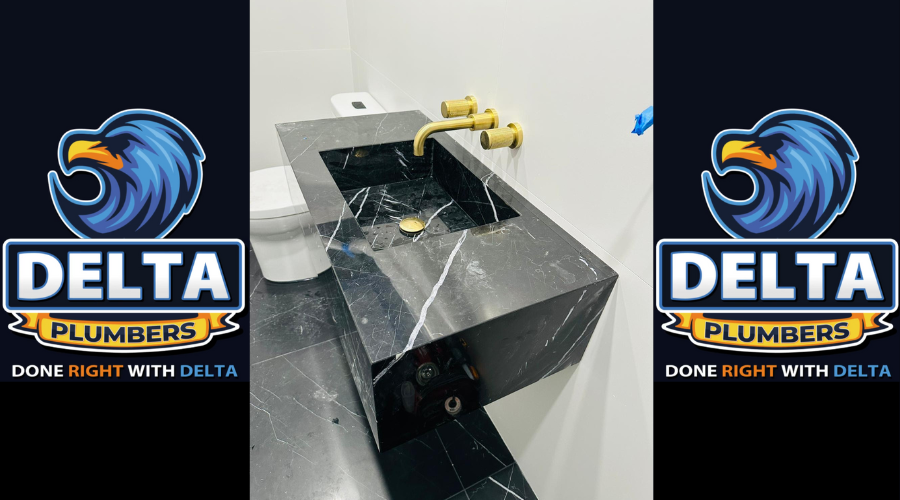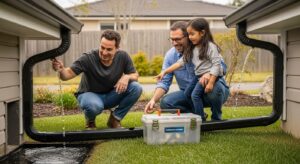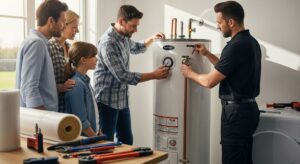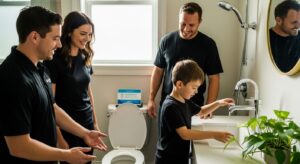As summer approaches, it’s important to ensure your home’s plumbing system is prepared for the warmer months. Ontario homeowners face unique challenges, and at Delta Plumbers, we know how crucial it is to maintain your plumbing to keep it running efficiently and prevent any unexpected issues. This comprehensive summer plumbing maintenance checklist will help you keep your home in top condition, ensuring it remains safe, comfortable, and efficient throughout the season.

Picture Source – Delta Plumbers
1. Inspect Plumbing and Pipes
Why It’s Important
Summer heat can cause pipes to expand and contract, leading to potential leaks. Checking for issues early can prevent more significant problems down the road.
What to Do
- Look for Leaks: Check under sinks, around toilets, and near appliances for signs of leaks. Address any leaks promptly to avoid water damage and mold.
- Inspect Pipes: Look for signs of corrosion or damage on exposed pipes. Pay special attention to areas where pipes may have frozen over the winter.
- Test Water Pressure: Low water pressure can indicate a problem with your plumbing. If you notice a drop in pressure, contact a professional plumber for an inspection.
2. Service Your Water Heater
Why It’s Important
A well-maintained water heater operates more efficiently and lasts longer. Regular maintenance can prevent unexpected breakdowns.
What to Do
- Flush the Tank: Drain a few gallons of water from the tank to remove sediment buildup. This can improve efficiency and extend the heater’s life.
- Check the Anode Rod: Inspect the anode rod, which helps prevent tank corrosion. Replace it if it’s heavily corroded.
- Set the Temperature: Ensure the thermostat is set to 120°F to prevent scalding and save energy.
Also Read: Sewer Repair Service: A Comprehensive Guide

Picture Source – Delta Plumbers
3. Inspect and Service Your Sump Pump
Why It’s Important
Your sump pump prevents basement flooding by removing excess water. Ensuring it works correctly is essential, especially during the summer storm season.
What to Do
- Test the Pump: Pour water into the sump pit to see if the pump activates and removes the water. If it doesn’t, troubleshoot or call a professional.
- Clean the Pit: Remove any debris from the sump pit that could clog the pump.
- Check the Discharge Line: Ensure the discharge line is clear and directs water away from your home.
4. Check for Leaks and Drips
Why It’s Important
Leaks and drips can waste water and lead to higher utility bills. Fixing them promptly can save water and money.
What to Do
- Inspect Faucets and Showerheads: Look for leaks or drips. Replace washers or cartridges if necessary.
- Check Outdoor Faucets: Ensure outdoor faucets and hoses are not leaking. Repair any leaks to prevent water waste.
- Examine Toilet Tanks: Check for leaks in toilet tanks by adding a few drops of food coloring to the tank. If the color appears in the bowl without flushing, you have a leak that needs fixing.
Also Read: Faucet Installation: A Comprehensive Guide by Delta Plumbers

Picture Source – Delta Plumbers
5. Clean and Maintain Drains
Why It’s Important
Clogged drains can lead to slow drainage and unpleasant odors. Regular cleaning prevents build-up and keeps drains flowing smoothly.
What to Do
- Clean Sink and Shower Drains: Remove any hair, soap scum, and debris from drains. Use a drain cleaner or a mixture of baking soda and vinegar to clear minor clogs.
- Check Outdoor Drains: Ensure outdoor drains are clear of leaves and debris to prevent water from backing up during heavy rains.
- Maintain Garbage Disposal: Run cold water while using the garbage disposal and avoid putting fibrous or starchy foods down the drain. Clean the disposal by grinding ice cubes and citrus peels.
6. Inspect Septic System
Why It’s Important
A well-maintained septic system prevents backups and costly repairs. Regular inspections ensure the system functions properly.
What to Do
- Schedule a Professional Inspection: Have a professional inspect your septic system at least once every three years.
- Pump the Tank: If necessary, pump the septic tank to prevent overflow and maintain system efficiency.
- Monitor Usage: Be mindful of water usage and avoid flushing non-biodegradable items to prevent clogs.
Also Read: Drain Repair Services in Vaughan with Delta Plumbers

Picture Source – Delta Plumbers
7. Check Washing Machine Hoses
Why It’s Important
Washing machine hoses can deteriorate over time, leading to leaks and water damage. Regular inspections help prevent unexpected hose bursts.
What to Do
- Inspect Hoses for Cracks and Bulges: Look for any signs of wear and tear. Replace hoses if you notice any damage.
- Ensure Proper Connections: Tighten any loose connections to prevent leaks.
- Consider Upgrading to Stainless Steel: Stainless steel hoses are more durable and less prone to bursting compared to rubber hoses.
8. Prepare for Vacation
Why It’s Important
If you’re planning a summer vacation, it’s essential to prepare your plumbing to prevent issues while you’re away.
What to Do
- Turn Off the Main Water Supply: Shutting off the main water supply can prevent potential leaks and water damage.
- Check for Leaks Before Leaving: Inspect your home for any leaks and fix them before you go.
- Set Water Heater to Vacation Mode: If your water heater has a vacation mode, use it to save energy while you’re away.
Also Read: Best Plumber: How to Find One Near You

Picture Source – Delta Plumbers
9. Inspect Outdoor Plumbing
Why It’s Important
Outdoor plumbing, including hoses, sprinklers, and irrigation systems, requires regular maintenance to function efficiently during the summer.
What to Do
- Check Hose Bibs and Spigots: Ensure they are not leaking and are functioning properly.
- Inspect Sprinkler Heads: Check for clogs or damage and clean or replace as necessary.
- Test Irrigation System: Run the system to check for proper operation and adjust the sprinkler heads to avoid water waste.
10. Plan for Water Conservation
Why It’s Important
Summer often brings higher water usage. Implementing water conservation measures helps reduce your water bill and benefits the environment.
What to Do
- Install Low-Flow Fixtures: Consider installing low-flow showerheads and faucets to reduce water usage.
- Water Lawn Efficiently: Water your lawn in the early morning or late evening to minimize evaporation. Use a rain sensor on your irrigation system to avoid watering when it’s not needed.
- Fix Leaks Promptly: Address any leaks immediately to prevent water waste.
Conclusion
Summer is a time of sunshine and outdoor activities, making it the perfect season to tackle plumbing maintenance tasks. By following this comprehensive checklist from Delta Plumbers, Ontario homeowners can ensure their plumbing systems remain efficient, reliable, and problem-free throughout the season. Regular maintenance not only prevents costly repairs but also enhances the enjoyment of your home during the beautiful summer months.









